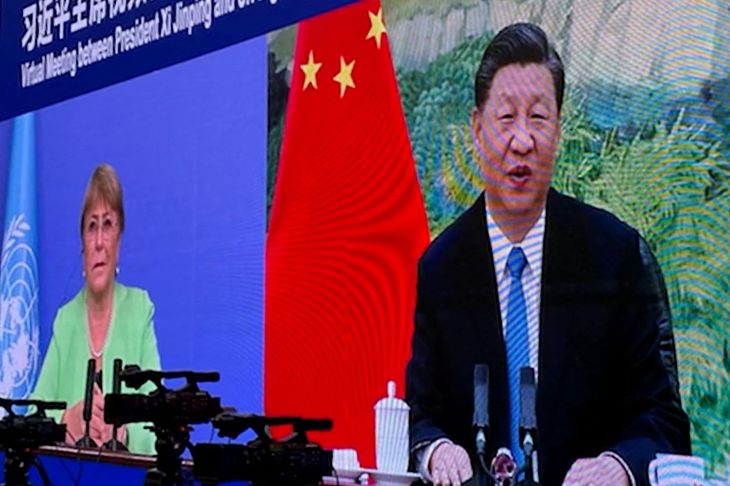From 2011 -2013, I served as Deputy Spokesperson for the U.N. Secretary-General.
This gave me a first-hand view of the virtues and deficiencies of the organization and required me to defend its values when member states obviously ignored them cynically.
During the past decade, the world has undergone fundamental changes in the confidence people have of their national and multilateral institutions.
In this vein, I must admit that my own faith in the United Nations has also eroded and may well continue to do so unless the organization develops the moral strength to force member states to live up to their commitments.
I will share a few examples of the way the United Nations has failed in its mission to create credible institutions capable of inspiring people and gaining their support.
A few weeks ago, United Nations High Commissioner for Human Rights Michelle Bachelet paid a long-anticipated visit to China to investigate the Chinese government’s oppression of its Muslim Uyghur minority.
The visit turned out to be a joke.
Forced to visit China without a coterie of human rights experts and international journalists, she was led from one Chinese Potemkin Village to another, inspecting only what the authorities wanted her to see and speaking to individuals hand-picked by the state.
At the end, her public report appeared to have been written by Chinese authorities, and there has been a global call for her resignation.
After an illustrious career that saw her serve twice as President of Chile and head of U.N. Women, her professional credibility has been destroyed, as has the credibility of the U.N.’s human rights bureaucracy.
When countries like China, Cuba, the Democratic Republic of Congo, Nicaragua, Saudi Arabia, and Venezuela are allowed to sit on the U.N. Human Rights Council despite their egregious and systemic violations of basic human rights, one must question whether the organization is fit for purpose.
Since they are elected by member states, one must question the membership’s commitment to the values and goals to which they presumably committed.
Another egregious example of the weak leadership in the U.N. organization was the visit to China of the Director General of the World health Organization Dr Tedros Adhanom Ghebreyesus immediately after the Covid-19 pandemic broke out. Rather than take the Chinese authorities to task for refusing to share vital information needed by the international community to address this deadly disease, he returned singing the praises of the Chinese authorities even though they had mismanaged the crisis.
He too is discredited, and the U.N.´s handling of the Covid-19 pandemic got off to a negative start.
Finally, last month, North Korea became Chair of the 65-nation United Nations Conference on Disarmament. North Korea is one of the most highly armed states in the world, a dictatorship that has already created a nuclear arsenal and missile delivery system with which it threatens its neighbors while it oppresses its own citizens.
Again, the cynicism involved here calls into question the ability of the United Nations to create the conditions through which member states are made to respect their commitments or shamed and sanctioned into respecting them.
The fact that the leadership of the organization is weak and sends out the wrong signals was once again apparent when Secretary-General Antonio Guterres took two months before he finally visited Ukraine and Russia. He appeared to be forced by a letter signed by over 300 staffers who shamed him into going.
Rather than visit the victim of this destructive invasion first, he chose to first go to Moscow to meet with President Putin.
Again, catering to a powerful aggressor regardless of the political implications and costs.
The U.N. is in decline, and public confidence is waning rapidly.
Sadly, this decline in the public credibility of the U.N.’s political bodies and some of its senior leaders is tarnishing the careers of tens of thousands of U.N. public servants who work diligently for the benefit of hundreds of millions of people around the world, often in dire circumstances and at great risk to their own lives.
Credibility will be hard if not impossible to recover, especially if member states continue to approach their commitments with cynicism and the U.N.’s leadership continues to cater to the most powerful and disregard their responsibility for enforcing the U.N. Charter and the values that it represents.
Sigue leyendo: Los desafíos de Canadá
Edición: Laura Espejo
E pelotero fue evaluado por un especialista tras experimentar una semana de dolor
Ap
Las plataformas digitales permiten a los propietarios generar un ingreso y seguir expandiendo la oferta
Ana Ramírez
El dominicano ayudó a los Serafines a lograr un juego sin hit combinado
Antonio Bargas Cicero
El Ejecutivo federal reafirma que minerales estratégicos como el litio son patrimonio exclusivo de la Nación
La Jornada Maya
